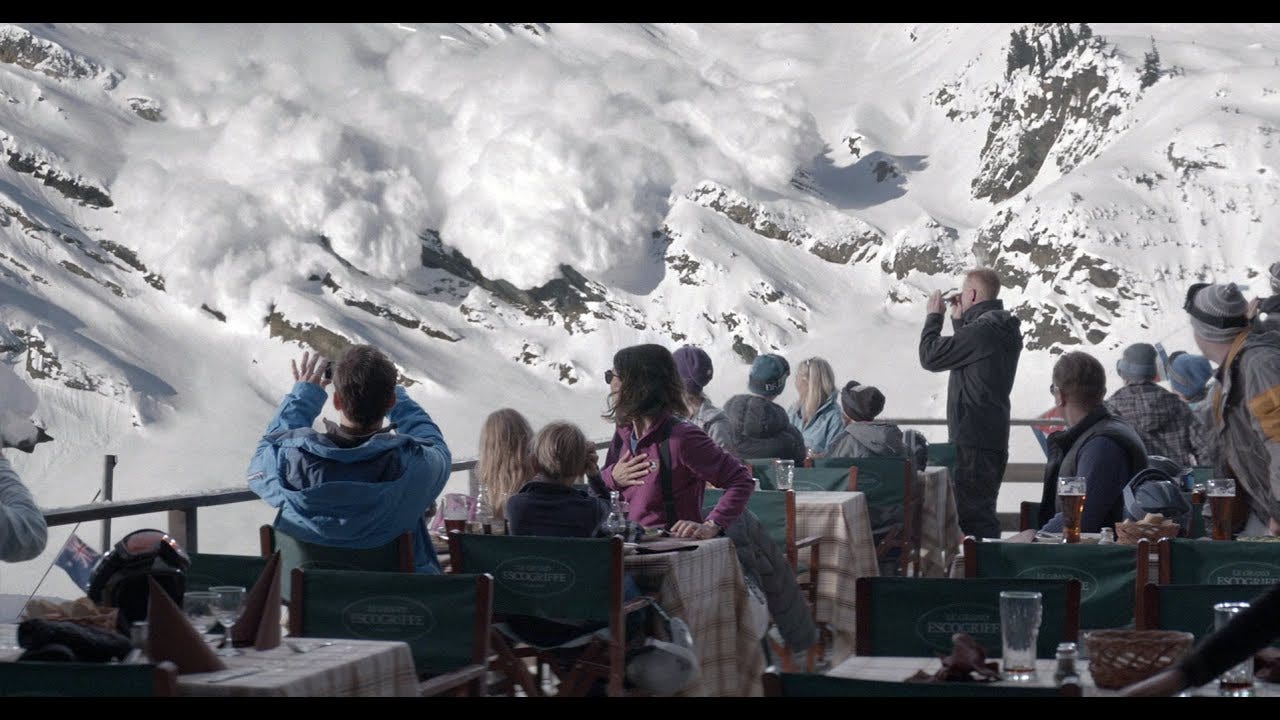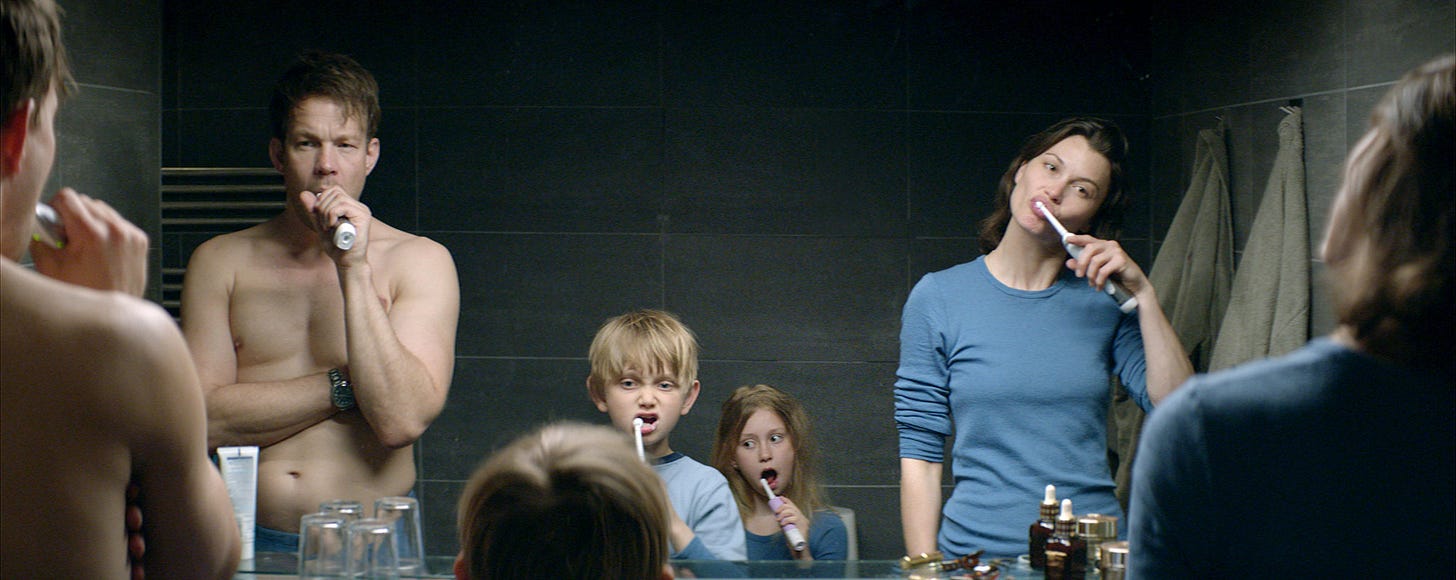Force Majeure Mocks Masculinity
That makes it a pretty typical action movie.
Force Majeure (2014) might be called an anti-action or inaction movie; it’s about how one guy fails to be a hero, and thereby loses the girl. It’s a satire of Hollywood masculine ideals—but one which ends up in many ways affirming those ideals rather than undermining them. In doing so it demonstrates, intentionally or otherwise, how heavily Hollywood’s empowered heroes rely on an implicit or explicit contrast with disempowered non heroes.
The movie is set in the French Alps—a suitably remote location for exotic battles against the forces of nature. Swedish businessman Tomas (Johannes Bah Kuhnke) and his Norwegian wife Ebba (Lisa Loven Kongsli) are on a skiing vacation with their two young children. Things seem to be going well until they witness a controlled avalanche from a restaurant with a dramatic scenic view. The avalanche appears to be about to swamp the resort, and in a panic Tomas grabs his gloves and phone and runs away, leaving Ebba to try to rescue the children. Luckily, it was a false alarm, and no harm is done—except to Tomas and Ebba’s marriage, which is damaged perhaps beyond repair.
What kind of action man are you?
Based on action movie clichés, Tomas of course was supposed to rescue his family when danger loomed—or at least, he was supposed to have tried to rescue them, sacrificing himself in the attempt. His failure makes Ebba question his commitment to his family and his fitness as a father and husband. It also undoes Tomas’ faith in himself. At first he simply denies he ran away, but when confronted with video evidence, he sinks quickly into self pity and self loathing. A one scene he sobs uncontrollably in the hallway outside their room while Ebba looks on in disgust. (And then finds she doesn’t have the keycard and can’t get them back into the room.)
Tomas’ friend Mats (Kristofer Hivju) argues that you can people under stress sometimes act in ways that aren’t in line with their values, and that it’s not really fair to condemn them for that.
It’s a reasonable and even compassionate argument, but Mats doesn’t quite believe it—when his girlfriend Fanny (Fanni Metelius) suggests he too would have run away he is very upset. Nor is the film exactly forgiving of frailties. Director Ruben Östlund’s camera is clinical and cold, framing human figures against great mountains of snow, or isolated in the hotel hallways against the grid-like tiers of rooms. The avalanche disaster is shot from a single camera set back from Tomas’ family—it feels like you’re looking at it through the eye of some dispassionate and judgmental God.
It's a bit of a surprise, then, when this very static and distanced narrative starts to contrive ways for Tomas to redeem himself. First Ebba is briefly lost in a fog on the mountainside, and Tomas rushes off to find her, returning with her in his arms. Then, at the end of the film, the family is on a bus trip down a mountain, when the driver starts to have some trouble controlling the vehicle. Ebba panics, and orders the bus to stop. She then races off—leaving Tomas and Mats to help the children disembark. The last scene of the movie is Tomas walking with his preschool son down the mountain when another refugee from the bus offers him a cigarette. He takes it and smokes for the first time onscreen—a rather obvious metaphor for regaining manhood via phallic symbol.
The parody of a hero is just a hero
Early on, Tomas looks like a parody of a hero—a guy who runs away when things get tough and then just blandly lies about it. But the thing is, in a lot of action movies, the hero starts out as something of a parody. Heroes generally fail in the first act. They get shot, or fail to save the girl, or betray themselves. Action movies vigorously disempower their heroes before they empower them; the better to make the empowerment feel more empowering. Thanos has to wipe out half the people in the universe so it reads as a real triumph when Iron Man turns him to dust. Spider-Man has to unheroically let Uncle Ben die so it’s meaningful when he decides to dedicate his life to saving people. And so on.
The stakes in Force Majeure are different, but that doesn’t necessarily change the dynamic or the message. Tomas starts out unmanly, ridiculous, and unable to fulfill his masculine function (as father, as husband, as hero), and then redeems himself. The movie doesn’t criticize the idea that Tomas has to be a hero to be a man. Rather it criticizes him for not being a hero and recuperates him by allowing him to be heroic. It’s notable too that Tomas saves Ebba, and then the movie carefully humiliates her in the same way it humiliated Tomas, as if the reassertion of patriarchal authority requires putting her back in her place. When you pick up action movie structures, you pick up some action movie misogyny, too.
Force Majuere is dedicated to humiliating its male protagonist. But humiliating men doesn’t undermine patriarchy. On the contrary, patriarchy thrives on narratives about male failure and male disempowerment. Tomas fleeing the avalanche and cowering in the hall is necessary if you’re going to get the Tomas saving his wife or the Tomas smoking a cigarette. Patriarchy requires a bifurcated masculinity; hero and shmuck, strong father and infantilized doofus. Even in a sober art film, without a costumed avenger in sight, it’s hard to imagine Superman without Clark Kent.




